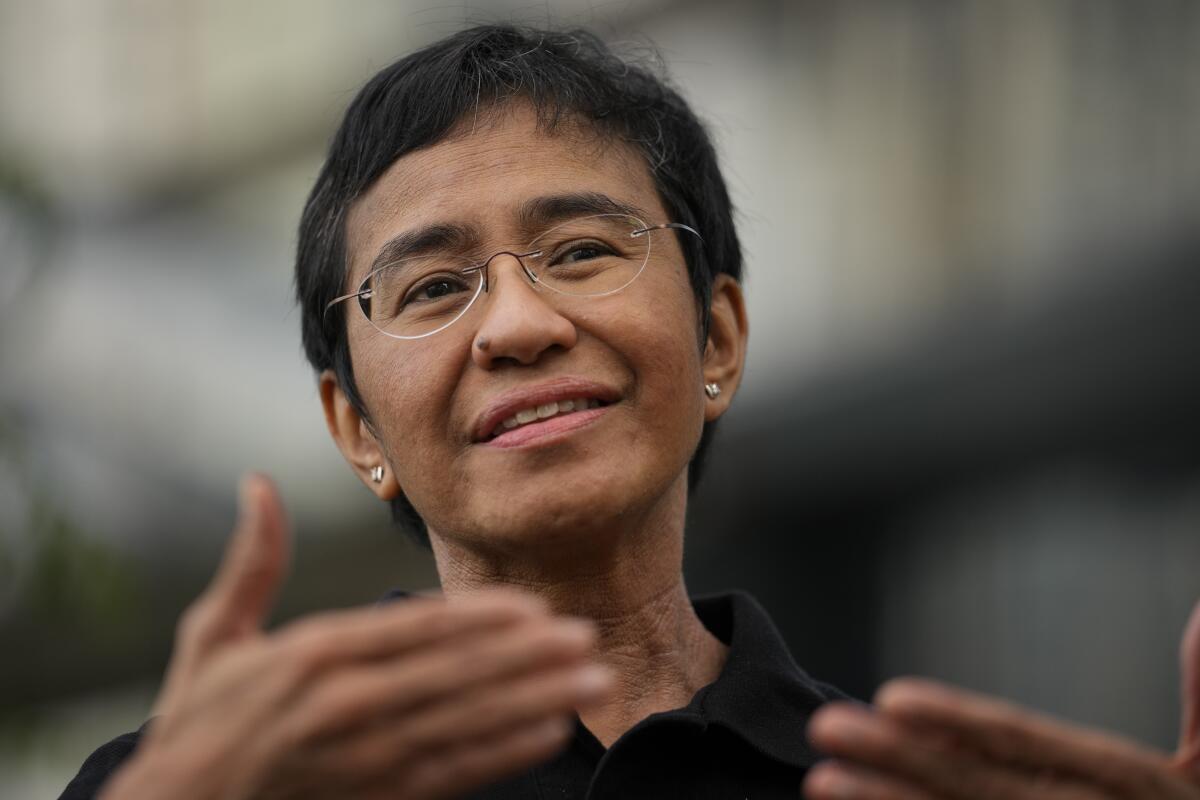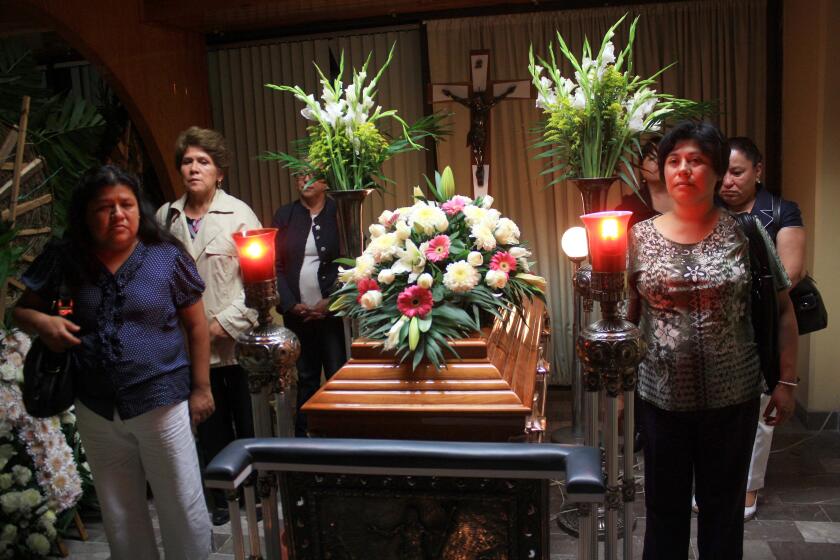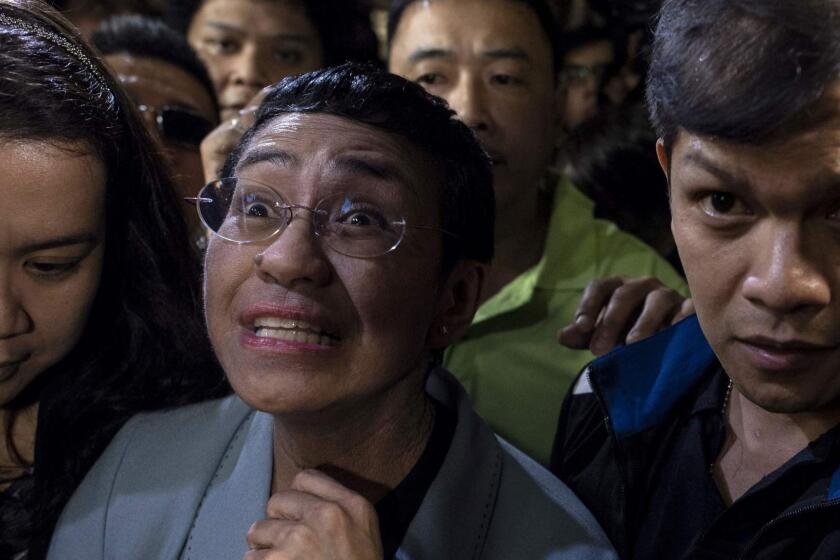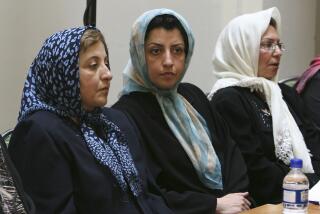Philippine government belatedly congratulates Nobel winner, denies prize was a rebuke

- Share via
MANILA — Philippine President Rodrigo Duterte’s administration belatedly congratulated journalist Maria Ressa on Monday for being one of two winners of this year’s Nobel Peace Prize in recognition of her fight for freedom of expression under grave risks.
However, it rejected suggestions that awarding the prize to Ressa was a rebuke of Duterte’s leadership, which has come under widespread criticism for veering toward authoritarianism.
Presidential spokesman Harry Roque said Ressa, who co-founded Rappler, a news website known for its tough reporting on Duterte’s bloody anti-drug crackdown, has been convicted of libel and faces other criminal charges, which the Philippines’ independent court system would adjudicate. Journalists were not being muzzled in the country, he said.
It was the first time the Duterte administration has publicly reacted to Ressa’s victory since the 58-year-old, who holds both Philippine and U.S. citizenship, won the award Friday. She shared the prize with Russian journalist Dmitry Muratov.
“There is no slap there [against the government], because as everyone knows, no one has ever been censored in the Philippines,” Roque said in reply to a reporter’s question at a news conference.
Roque sought to back up his statement by citing a Filipino National Artist awardee, Francisco Sionil Jose, who said in a statement that Ressa did not deserve the award and that “the Philippine press is alive and well not because of” her.
The awarding of the Nobel Peace Prize to two journalists for their fearless reporting resonated in newsrooms worldwide.
Duterte has not shut down any newspapers or radio stations, Jose said, adding that, even though the president exerted influence on Congress, which did not renew the license of leading TV network ABS-CBN — now shuttered — that was not a press freedom issue.
Jose conceded that journalists have been killed after doing tough reporting on local politicians and officials under Duterte — similar to what had happened under his predecessors. However, “those killings cannot be laid at Duterte’s door,” said the 96-year-old novelist, whose comments drew intense criticism and ridicule.
Despite that, Roque said the presidential palace agreed with his views.
The Norwegian Nobel Committee noted that Ressa’s Rappler news site, which was set up in 2012, has put a spotlight on Duterte’s “controversial, murderous anti-drug campaign” in the Philippines. Other domestic and international news agencies have also closely reported on the brutal campaign, which Duterte launched when he took office in 2016 and which has left more than 6,000 mostly poor suspects dead.
The remains of thousands killed in the Philippines’ war on drugs could be tossed in pits as families struggle to pay for burial sites amid a pandemic.
Western governments and human rights groups have repeatedly expressed concerns about the level of brutality and lack of due process.
The Nobel Committee also cited the work of Ressa and Rappler in documenting “how social media is being used to spread fake news, harass opponents and manipulate public discourse.”
Ressa shares the award with Russia’s Muratov, a co-founder of the independent Russian newspaper Novaya Gazeta, which the Nobel Committee called “the most independent newspaper in Russia today, with a fundamentally critical attitude towards power.” Six of its journalists have been killed since its founding in 1993, the committee said.
Ressa was convicted last year of libel and sentenced to up to six years in jail in a decision that media watchdogs called a major blow to press freedom in an Asian democracy.
A day after posting bail, a defiant Maria Ressa sat in a car winding its way through Manila’s notoriously congested traffic to attend a rally in support of press freedom.
The Manila court found Ressa and a former Rappler reporter, Reynaldo Santos Jr., guilty of libeling a wealthy businessman, who was linked to a murder, drug-dealing, human-trafficking and smuggling in a story that cited an intelligence report. The businessman denied the allegations and complained that Rappler did not publish his side of the story. The website’s lawyers disputed any malice and said the statute of limitations for filing the libel complaint had passed.
Ressa and Santos have appealed the convictions.
“The Philippine government filed 10 arrest warrants against me. In the last year, the government has prevented my travel four times, including when my mother was diagnosed with cancer and I needed to go to see my aging parents,” Ressa said in a Zoom interview after she won the Nobel Prize on Friday.
Duterte and other Philippine officials have said the criminal complaints against Ressa and Rappler were not a press freedom issue but part of normal judicial procedures arising from their alleged violations of the law.
Duterte has openly lambasted journalists and news sites that report critically about him, including the Philippine Daily Inquirer, a leading daily, and ABS-CBN, which was shut down by the government’s telecommunications regulator after its 25-year license expired.
More to Read
Sign up for Essential California
The most important California stories and recommendations in your inbox every morning.
You may occasionally receive promotional content from the Los Angeles Times.













